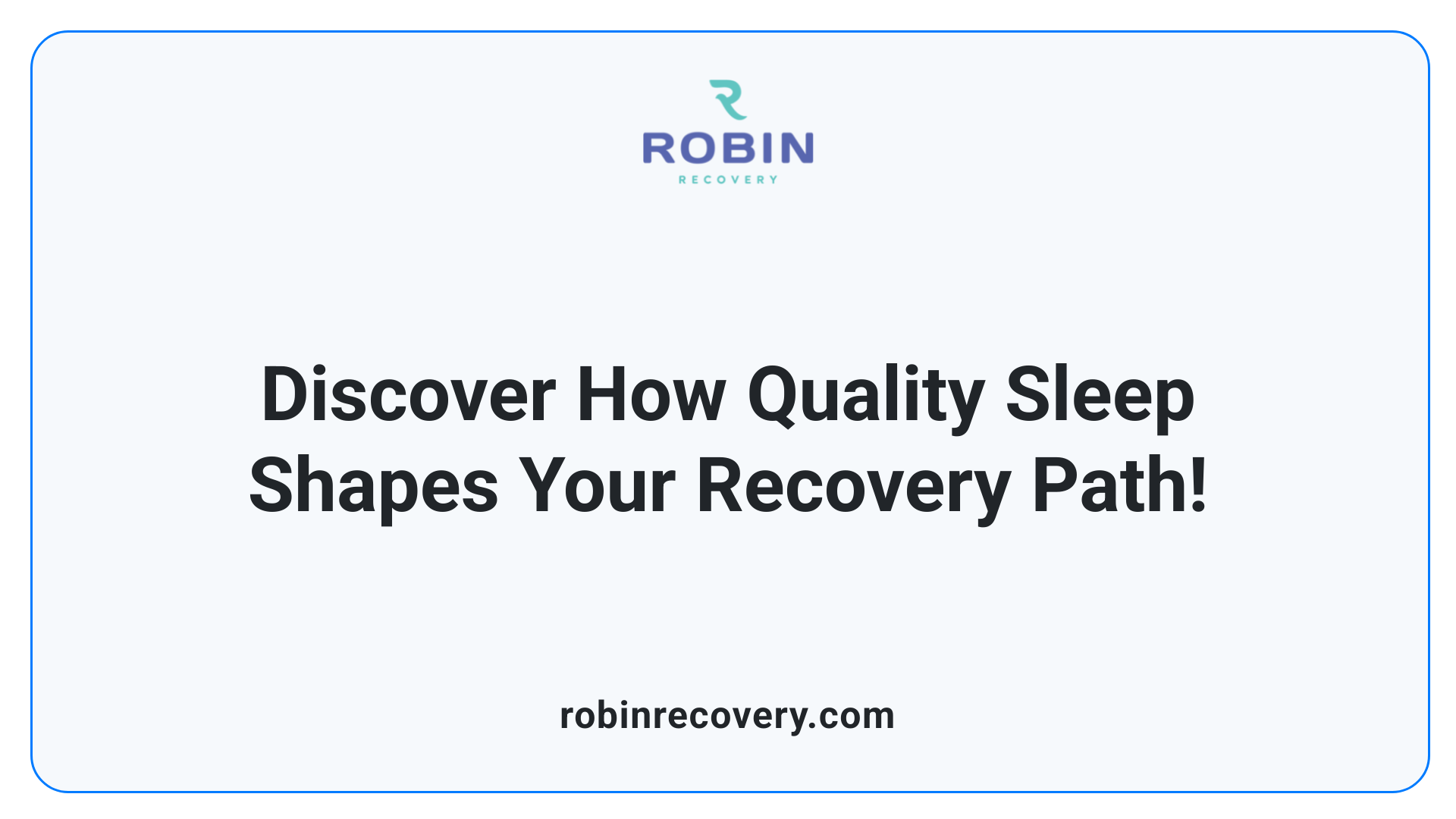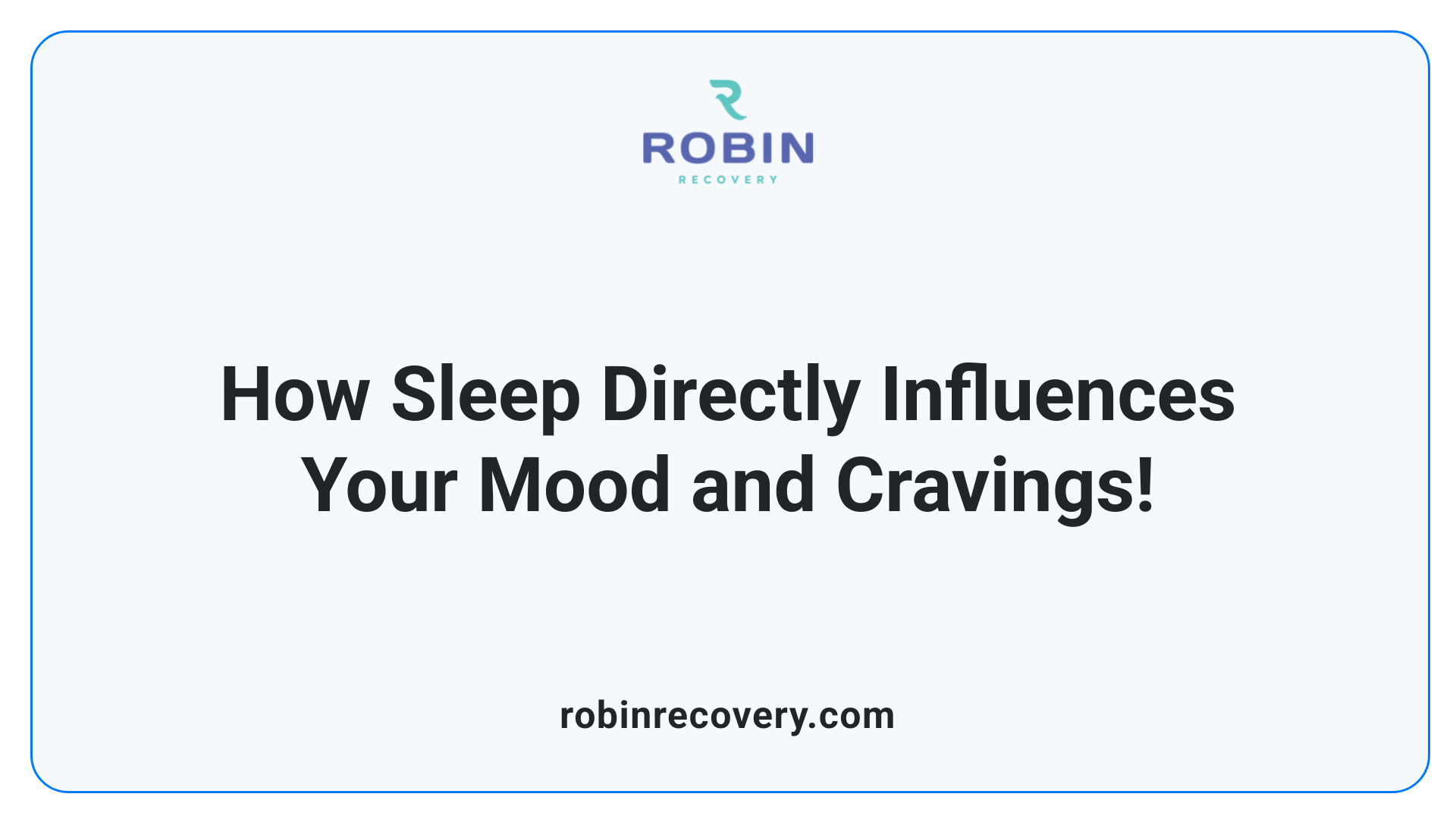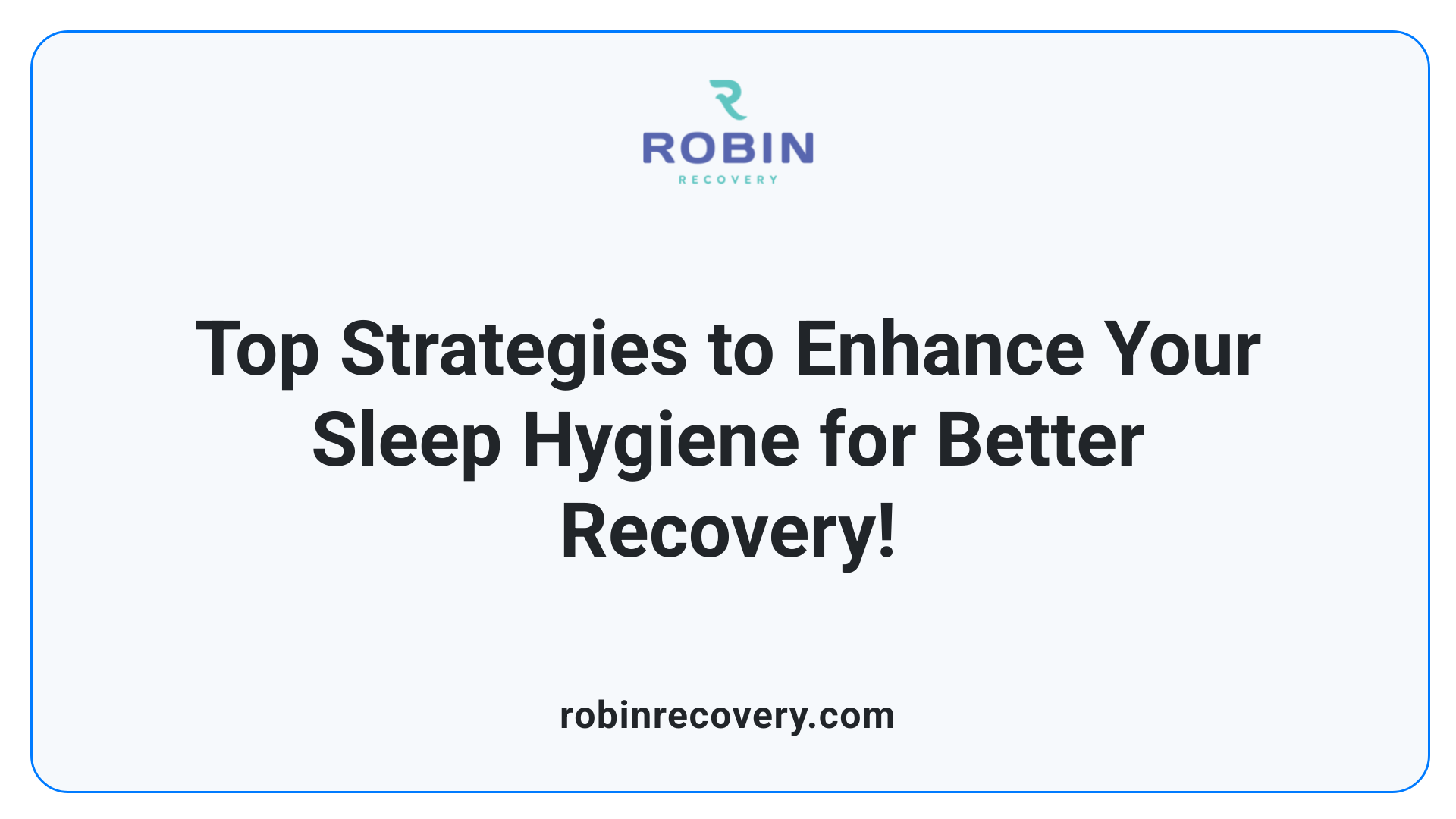The Importance of Sleep in Recovery from Addiction

Understanding Sleep's Significance in Recovery
Sleep is an often overlooked yet vital component of the addiction recovery process. During recovery, the body's physiological mechanisms for repair and mental restoration are crucial to overcoming substance dependencies and maintaining sobriety. Scientific research highlights sleep as a cornerstone, influencing everything from emotional regulation to cognitive function, all critical for effective addiction treatment. This narrative explores the multifaceted role sleep plays in recovery, illustrating its influence on health outcomes and strategies to enhance sleep hygiene.
Sleep's Role in Supporting Recovery

What is the role of sleep in addiction recovery?
Sleep plays a vital role in addiction recovery by supporting both physical and mental health. Adequate sleep helps in:
- Emotional Regulation: Quality sleep reduces stress and anxiety by regulating cortisol levels. This stabilization is crucial, as heightened stress can trigger relapse in individuals recovering from addiction.
- Cognitive Function: Sleep enhances decision-making and concentration, skills necessary for navigating the challenges of recovery. Impaired cognitive function due to lack of sleep can make individuals more susceptible to cravings and poor choices.
Recovery individuals often experience sleep disturbances, such as insomnia, which can exacerbate addiction-related issues. These disturbances highlight the need for effective sleep management strategies, including:
- Establishing a consistent bedtime routine
- Utilizing relaxation techniques such as mindfulness or meditation
- Cognitive Behavioral Therapy for Insomnia (CBT-I), recommended as a non-pharmacological treatment.
A focus on improving sleep quality is essential to reinforce recovery efforts. By addressing sleep issues, individuals can enhance their emotional stability, reduce the risk of relapse, and ultimately improve the odds of a successful recovery.
Influence of Sleep Quality on the Recovery Process

How does sleep quality affect the recovery process?
High-quality sleep is essential for the recovery process, as it plays a critical role in restoring both mental and physical health. During sleep, the body undergoes vital physiological processes, including neurochemical balance and cellular repair, which are crucial for healing and regeneration.
- Physical Health: Adequate sleep aids in detoxification and bolsters the immune system, facilitating recovery from illnesses.
- Mental Health: Sleep significantly influences mood and emotions, regulating hormones such as serotonin, which is key to emotional stability.
- Cognitive Function: Quality sleep enhances decision-making skills, focus, and memory, allowing individuals to face recovery challenges more effectively.
Poor sleep quality can exacerbate emotional disturbances, impair cognitive functions, and increase stress, all of which can hinder recovery and lead to relapse, especially in individuals overcoming addiction. For instance, lack of sleep can elevate cortisol levels, intensifying stress and anxiety, which are common triggers for relapse.
Consequences of poor sleep quality
Individuals in recovery often experience poor sleep quality, which can have serious repercussions:
- Increased Relapse Risk: Those recovering from substance use disorders are significantly more likely to relapse if they do not get sufficient sleep.
- Mental Health Issues: Poor sleep is linked to heightened anxiety, irritability, and mood swings, detrimental to emotional well-being.
- Cognitive Limitations: Sleep deprivation affects concentration and memory, hindering the ability to make informed choices during recovery.
Effective sleep management strategies, such as maintaining good sleep hygiene and addressing sleep disorders, can significantly enhance the recovery journey by promoting better mood and cognitive function. Overall, prioritizing restorative sleep contributes to improved health outcomes and supports the body's natural recovery mechanisms.
Consequences of Sleep Deprivation in Recovery

What are the consequences of sleep deprivation during recovery from addiction?
Sleep deprivation during recovery from addiction can have profound and detrimental consequences. It exacerbates mood swings, increases stress levels, and heightens cravings, raising the risk of relapse considerably. Poor sleep disrupts physical and mental well-being, making cognitive dysfunction and emotional regulation much harder to achieve. This deterioration in mental health can lead individuals to misuse substances as a form of self-medication, thereby deepening the cycle of addiction.
Research indicates a clear relationship between sleep disturbances and relapse across various substances. Insomnia, in particular, is a strong predictor of relapse risk, especially in cases of alcohol dependence. A troubling cycle occurs: substance use disrupts sleep patterns, while inadequate sleep makes individuals more vulnerable to cravings and emotional instability, often leading to relapse.
To combat these spiraling issues, addressing sleep problems is crucial. Interventions such as Cognitive Behavioral Therapy for Insomnia (CBT-I) can significantly improve sleep quality, which is associated with better recovery outcomes. Thus, recognizing and treating sleep disturbances serves as an essential step in the journey to maintaining sobriety.
Interplay Between Sleep and Substance Use Disorders
How do sleep disorders relate to substance use disorders?
Sleep disorders and substance use disorders (SUDs) share a deep-rooted connection that often complicates recovery. Individuals battling addiction frequently experience disruptions in sleep, which manifest as insomnia, difficulty falling or staying asleep, and excessive daytime fatigue.
This ongoing struggle with sleep challenges compounds the primary issue of addiction, creating a vicious cycle. When deprived of adequate rest, individuals may find it difficult to make sound decisions and manage their emotions, ultimately increasing the risk of relapse. Elevated stress and irritability from sleep deprivation can contribute significantly to cravings for substances as individuals may turn to drugs or alcohol seeking relief from these emotional upheavals.
Additionally, the repercussions of sleep disturbances can extend well beyond the initial withdrawal period. Persistent sleep issues can hinder the recovery journey, emphasizing the need for targeted interventions that prioritize sleep hygiene. Improving sleep quality becomes crucial not only for maintaining sobriety but also for enhancing overall health and well-being in individuals recovering from SUDs.
Impact of sleep disturbances on relapse risks
The correlation between sleep and relapse is particularly pronounced. Studies indicate that recovering individuals who experience poor sleep are significantly more likely to relapse, especially those recovering from alcohol use disorder. Persistent insomnia and restless sleep often lead to escalated cravings and emotional instability, making relapse more likely.
Experts agree that managing sleep quality is essential in the recovery process, suggesting comprehensive treatment approaches that include cognitive behavioral therapy (CBT) to address insomnia without relying on potentially addictive medications. By fostering better sleep habits, individuals in recovery can position themselves for improved emotional regulation and resilience against relapse triggers.
Understanding and addressing sleep disorders within the context of addiction recovery can positively influence overall outcomes and foster healthier, more sustainable recovery pathways.
Impact of Sleep on Mood and Cravings

What impact does sleep have on mood and cravings in recovery?
Adequate sleep is vital for those in recovery from addiction, as it helps stabilize mood and reduce cravings, both of which are critical for maintaining sobriety.
Addiction disrupts sleep and alters brain chemicals like dopamine and serotonin. This disruption can lead to heightened emotional stress and increased cravings. Studies show that lower sleep quality correlates with both increased cravings and a negative mood.
Sleep is crucial for coping with stress and enhances treatment effectiveness. For instance, it regulates cortisol levels, a stress hormone that, when elevated, can trigger cravings and relapse. Individuals recovering from addiction are particularly vulnerable to sleep disorders, making sleep management essential to improve recovery outcomes.
How sleep enhances recovery outcomes
Improving sleep quality can greatly influence recovery from addiction. Quality sleep promotes emotional regulation, helping individuals manage cravings and improve overall mood, thereby enhancing their resilience against triggers related to substance use. It allows for restoration and repair, vital for rebuilding health after addiction. Furthermore, a regular sleep pattern supports cognitive functions such as decision-making and problem-solving, thereby reducing impulsivity and increasing the chances of successful sobriety. Recognizing and prioritizing sleep as a fundamental aspect of recovery can foster healthier habits, leading to a more sustainable recovery journey.
Aspect Description Importance in Recovery Mood Regulation Sleep helps stabilize emotions and mood swings. Reduces risk of depression and anxiety during recovery. Cravings Management Quality sleep lowers cravings and helps with impulse control. Decreases likelihood of relapse and maintains sobriety. Cognitive Function Restorative sleep enhances memory and decision-making. Improves overall coping strategies and resilience in recovery. Stress Reduction Adequate sleep regulates cortisol and stress levels. Lowers emotional triggers, contributing to recovery success.
Evidence Linking Sleep Disturbances to Relapse
What evidence is there about sleep disturbances and relapse?
Research strongly indicates that sleep disturbances are a significant predictor of relapse in individuals recovering from substance use disorders, particularly alcohol use disorder (AUD). Sleep disorders can lead to emotional instability and increased stress, heightening the risk of returning to substance use.
Both objective measures of sleep (such as slow wave and REM sleep disturbances) and subjective assessments of sleep quality correlate with relapse rates. Studies show that irregular sleep patterns are commonly associated with relapse for those dealing with AUD. For instance, poor sleep quality can lead to elevated cravings and a deterioration in mood, which significantly impacts recovery outcomes.
Persistent sleep issues can derail treatment efforts, making it essential to identify and treat sleep disturbances as part of an effective recovery strategy. Addressing these disorders through targeted interventions, like cognitive behavioral therapy or improved sleep hygiene practices, not only enhances sleep quality but is likely to improve overall recovery and reduce relapse rates.
The critical role of sleep in maintaining sobriety and its effects on mental health underscore the importance of prioritizing sleep management within addiction treatment frameworks.
Strategies for Enhancing Sleep Hygiene

What strategies can enhance sleep hygiene during the recovery journey?
Enhancing sleep hygiene is essential for individuals in recovery. Here are some effective strategies:
- Maintain a Consistent Sleep Schedule
- Aim for consistent sleep and wake times to regulate the body’s internal clock, which improves overall sleep quality.
- Create a Relaxing Bedtime Routine
- Engage in calming activities like reading or practicing mindfulness to signal to your body that it’s time to wind down.
- Optimize the Sleep Environment
- Ensure that your bedroom is dark, quiet, and maintained at a comfortable temperature. A peaceful environment supports restful sleep.
- Limit Stimulants
- Avoid caffeine and nicotine, especially in the hours before bedtime, as these can interfere with sleep onset and quality.
- Incorporate Regular Physical Activity
- Daily exercise promotes better sleep, though vigorous workouts should be avoided close to bedtime to allow your body time to relax.
- Seek Professional Help
- If sleep disturbances persist, consider cognitive behavioral therapy for insomnia (CBT-I), which is effective in addressing sleep issues without relying on medications that could interfere with recovery.
By implementing these strategies, recovering individuals can significantly enhance their sleep hygiene, supporting their overall recovery journey.
Embracing Sleep as a Vital Component of Recovery
Understanding and prioritizing sleep is crucial for successful addiction recovery. As individuals work towards overcoming substance dependencies, recognizing the profound impact of sleep on emotional, cognitive, and physical health is essential. Through improved sleep hygiene, effective management of sleep disorders, and strategies like CBT-I, individuals can enhance their recovery prospects significantly. The journey to sobriety can be particularly challenging, but with adequate rest, the road to recovery becomes clearer and more attainable. Embracing the power of sleep underscores its vital role as a cornerstone of recovery, paving the way for sustained health and well-being.
References
- The Importance of Sleep in Addiction Recovery - Isaiah House
- The Importance of Sleep in Recovery
- Sleep Disturbance as a Universal Risk Factor for Relapse in ...
- Importance of Sleep in Addiction Recovery - NorthStar Transitions
- What Is the Importance of Sleep in Addiction Recovery?
- [PDF] Treating Sleep Problems of People in Recovery From Substance ...
- How Does Sleep Hygiene Impact Addiction Recovery? The ...
- Examining the Role of Sleep in Addiction Recovery
- How Sleep Affects Alcohol Recovery - The Raleigh House
- Addiction Recovery & Sleep - The Discovery House
